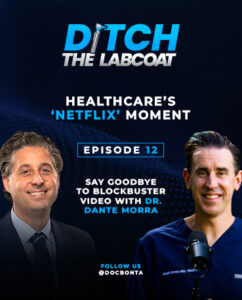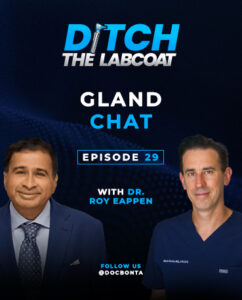Let me start with this: my latest guest, Dr. Nik Grujich, a psychiatrist, parent, and educator, might just be a modern-day revolutionary. He’s raising his kids without cell phones (gasp!), keeps his home candy-free (double gasp!), and spends his workdays navigating the intricate maze of the human mind. We dove deep into psychiatry, mental health, and parenting in what felt like a masterclass in navigating modern challenges with a side of wit. Here’s the scoop.
Cell Phones: Little Casinos for Tiny (and Big) Hands 
I kicked off the podcast with a juicy metaphor I recently heard: cell phones are “little casinos in our pockets.” Dr. Grujich, who might as well have been holding a protest sign that reads, Down with Tech Overload!, was quick to agree.
He shared his perspective as both a parent and a mental health expert: the magnetic pull of a smartphone is hard for even the most disciplined adults to resist—so why would we expect kids to stand a chance? Nik has twin daughters who remain among the rare unicorns in their grade without smartphones. He candidly described the tug-of-war between preserving their well-being and the reality that social connectivity now often comes with a screen attached.
His analogy? Smartphones are engineered to monopolize attention, like a gravitational black hole for our developing brains. And in the future? “We might look at adolescent phone use the way we now view cigarette smoking,” is something I shared, parroting this from one of my recent guests (Healthcare Innovator, Dr. Dante Morra).
Parenting Without Candy and Cell Phones: A Recipe for Mental Resilience
Dr. Grujich’s approach to parenting—tradition-focused yet forward-thinking—sparked equal parts admiration and curiosity. I joked about his house sounding like an amusement park that forgot the rides. No cell phones, no candy, but plenty of structure and tradition to tether his kids to their roots.
His reasoning was refreshingly honest: parenting is about downloading life skills and resilience. Anxiety, as he explained, can stem from the seeds parents unwittingly plant, like overprotective warnings about lightning, undercooked chicken, or the ever-menacing stranger in a van.
Instead of sheltering his kids from every bump in the road, Nik’s approach is to let them fall (sometimes literally) and figure out how to get back up—with love, of course. This philosophy builds the mental toughness necessary to navigate adulthood, where bubble wrap parenting simply doesn’t apply.
Psychiatry: It’s Not All Feelings Talk
Switching hats from parent to psychiatrist, Dr. Grujich gave us a whirlwind tour of his specialty, peppered with anecdotes that brought the DSM-5 (the Diagnostic and Statistical Manual of Mental Disorders, fifth edition) to life. Spoiler alert: psychiatry isn’t a rigid cookbook where you match symptoms to a diagnosis and call it a day.
“It’s all shades of gray,” Nik explained, likening his job to a detective piecing together biological predispositions, environmental influences, and personal experiences. Every patient is a unique puzzle, which makes psychiatry endlessly fascinating—and occasionally maddening.
Anxiety: The Good, the Bad, and the Necessary
If you’ve ever felt your heart pound in response to a scary situation, you’ve got your brain’s anxiety circuits to thank. Anxiety isn’t all bad—it’s a survival tool. Without it, our ancestors wouldn’t have survived long winters or outrun sabre-toothed tigers.
But when does useful anxiety morph into a problem? Nik broke it down beautifully: it’s all about whether the anxiety interferes with your ability to function. For example, checking that your door is locked? Fine. Doing it 50 times before leaving for work? That’s where we venture into obsessive-compulsive territory.
His practical example of specific phobias (like arachnophobia) had me grossly engaged, as a husband and parent to 2 spider-fearing (but fierce) women. As Dr. Grujich explained, a fear of spiders isn’t a problem if you live in a concrete jungle—but throw a needle phobia into a couple’s fertility journey, and suddenly, that fear becomes life-altering. Context is king in psychiatry.
Exposure Therapy: Spicy or Extra Spicy?
One of the highlights of our conversation was when Nik described exposure therapy, the go-to treatment for anxiety. There are two versions:
- Extra Spicy (Flooding)
Imagine being tossed into the deep end of a pool. Terrifying? Yes. Effective? Also, yes. Nik described seeing a parent do just that to their water-fearing child on vacation, and while the optics were questionable, the results were undeniable. - Spicy (Fear Hierarchies)
For those less inclined to “sink or swim,” there’s the gentler approach: gradual exposure. If your kid fears water, start with building sandcastles by the shore, then move to dipping toes, and eventually work up to swimming.
Both methods work, but the key is trust. Whether it’s a parent or a therapist leading the charge, the person facing their fears needs to know they’re not being pushed off a cliff without a safety net.
Preventing Anxiety: Lessons for Parents
So, what can parents do to help their kids develop a healthy mental thermostat? Dr. Grujich offered sage advice:
- Model Resilience: Let your kids see you tackle challenges head-on instead of avoiding them.
- Avoid Overprotectiveness: Every time you shout, “Careful, you’ll fall!” you plant a seed of fear.
- Encourage Growth Through Discomfort: It’s okay for kids to feel uneasy at a party where they know no one—it’s practice for adulthood.
Mental Health Is Health
Our conversation reminded me that mental health isn’t a siloed specialty—it’s intertwined with every other aspect of well-being. Dr. Grujich’s anecdotes about trauma therapy and even mindfulness reducing the risk of recurrent heart attacks were eye-opening.
His parting wisdom? Mental and physical health are inseparable, and fostering resilience starts with small, intentional habits.
For more insights head to the following podcast episodes:
Episode 29 Episode 31 Episode 32



Thanks, Nik, for bringing your expertise and humor to the podcast. Listeners, if you’re still on the fence about whether undergoing therapy is something that actually works and just something that sounds cool, just remember this: your brain is a mystery organ driving all your choices—and boy, does it need a good mechanic now and then. Robust mental health management with a trained professional is a prerequisite for the chaotic world we live in and parent in.
Until next time, ditch the lab coat, embrace the conversation, and keep building resilience.
Dr. Mark Bonta is a general internist, proud parent, and the host of the Ditch the Labcoat Podcast. He is still debating whether to allow cell phones into his household, as his oldest is 10 at the time of this publication.


